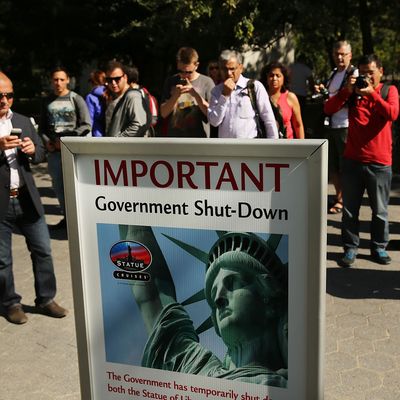
It’s beginning to look a lot like a government shutdown. Unless a hard-line faction within the House Republican caucus gets in line behind Speaker Kevin McCarthy by Sunday, the federal government will run out of funding — causing hundreds of thousands of federal employees to be furloughed, the closure of national parks, and potentially even more delays at already burdened U.S. airports. As the deadline looms, here’s what to expect from this extremely avoidable scenario.
The economy could face a temporary slump
The general rule about government shutdowns is that the longer one lasts, the greater the impact on the economy. A Congressional Budget Office study on the record-breaking shutdown in 2019 found that the U.S. economy took a $3 billion hit due to the 35-day standoff instigated by Donald Trump.
The impact of a government shutdown wouldn’t be immediate. Jared Bernstein, the White House Council of Economic Advisers chair, told Bloomberg that the economy could suffer 0.1 to 0.2 percentage points of quarterly growth for each week the government is on time-out. But he added that shutdowns “also cause unnecessary economic stress and losses that don’t always show up in GDP — from delaying Small Business Administration loans to eliminating Head Start slots for thousands of children with working parents to jeopardizing nutrition assistance for nearly 7 million mothers and children.” The large number of federal employees on unpaid furlough during a shutdown would also contribute to a temporary decrease in consumer spending.
How many people would get furloughed?
Some federal agencies, including the U.S. Postal Service and the United States Citizenship and Immigration Services, are immune to government shutdowns because they are self-funded. But all agencies that operate on budgets approved by Congress would be affected by the shutdown.
Critical workers like air traffic controllers and TSA agents would continue to work until the shutdown ends. Hundreds of thousands of employees who make up the backbone of the federal bureaucracy would be furloughed. But they will receive back pay for as long as the shutdown lasts. Federal contractors would also be affected: They would either be required to stop working or risk not getting paid for their work when the shutdown ends. Contractors do not receive back pay for work they do during shutdowns.
Air travel could become even more annoying
“There is no good time for a government shutdown, but this is a particularly bad time for a government shutdown, especially when it comes to transportation,” Transportation secretary Pete Buttigieg said on Wednesday. As most Americans know, flying is a huge pain right now, with massive delays piling on each other due largely to staffing shortages across the industry as it slowly crawls back from the massive decrease in travel during the pandemic. But a shutdown would stop the Federal Aviation Administration from training new air traffic controllers, creating more long-term issues for the industry. And the last time around, increases in unscheduled absences among TSA workers going without pay led to massive wait times at airports.
What would shut down altogether?
National parks could potentially close — or at least close all their services — possibly causing millions of dollars of lost revenue for the tourist towns surrounding the majestic areas. Federal law enforcement from the FBI to Border Patrol and the DEA would work without pay. Federal courts are funded to remain open until October 13, after which civil litigation would be put on hold. However, the two federal prosecutions of Donald Trump would not be put on hiatus.
How long could this thing last?
If there is a shutdown, the divided nature of the Republican House majority will make exit maneuvers more difficult. As New York’s Ed Kilgore explains, it’s hard to imagine this dynamic resolving in a quick and easy manner:
It’s unclear what will change in October or November to make a deal more likely, as both parties hunker down for a highly contentious 2024 election year. Yes, some Republicans fear inviting blame for a government shutdown. But in an atmosphere where the GOP’s presidential candidates are casually batting around proposals to permanently close multiple federal agencies and gut the “deep state,” it could take a while for public unhappiness with a shutdown to have any effect. Certainly Kevin McCarthy’s not going to throw away his gavel in an act of patriotic self-sacrifice when waiting out an extended shutdown might present more promising opportunities.
Why is this happening in the first place, again?
It’s been clear since day one of his speakership that Kevin McCarthy has an extremely fragile coalition on his hands. Far-right members of his caucus, who gained leverage during the long process of anointing him Speaker, are all too ready to wreak havoc when they can — which isn’t difficult, given the GOP’s slim House majority. In this instance, MAGA-wing Republicans like Lauren Boebert and Matt Gaetz are demanding the House approve individual appropriations bills rather than one big spending package to keep the federal government running — something that hasn’t happened since 1996. The goal is to initiate spending cuts on sections of the government one by one. These would be so restrictive (including a $14.7 billion cut to low-income schools) that the Democrat-controlled Senate would not consider them. McCarthy has also rejected a temporary funding measure put forward by Democrats, which would keep funding at its current level through November.






























